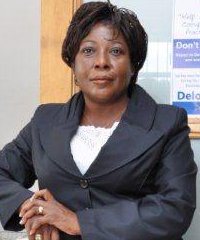How Divine Ndhlukula became one of Africa’s top women in business
Divine Ndhlukula started SECURICO, one of Zimbabwe’s largest security service providers, with only four employees in 1995. Now the firm has over 3,500 employees, including 900 women. Ndhlukula is a women entrepreneur in a typically male domain and is an outspoken women empowerment activist in Africa. How we made it in Africa asks Ndhlukula about what it is like to break down stereotypes and be a successful woman entrepreneur in Africa.

Divine Ndhlukula
What inspired you to start a security service company?
Firstly, I needed to create a decent livelihood for my family and I always knew that I wanted to go into business from a very tender age and would tell my friends in high school that the business I was going to start was going to be significant in size.
Secondly, I identified glaring gaps in the quality of service and professionalism in the private security sector and this inspired me to start a security company and make a difference.
Thirdly, I wanted to make a difference to disadvantaged women who could not get opportunities to get formal employment and I knew the security industry was a mass employer. I became an activist for the empowerment of women when I was very young, at school. When I started working I joined women empowerment groups and I got to meet various role models who inspired me to seek personal self-actualisation. That inspiration assisted me in my professional career and I was able to climb the corporate ladder. By the time that I saw the business opportunity in the security sector I was ready – both emotionally and experience wise.
What major challenges have you faced since starting SECURICO?
The first major challenge was that the industry was heavily male dominated and there was a general perception that security was not a job for women. The challenge was to convince the market that I could do the job despite the fact that I was a woman.
Clients even refused to be guarded by women and it took a lot of persuasion to convince them that their security would in fact improve if they accepted women to guard them. Changing that negative perception about women was not easy but my team and I persisted and with time women were widely accepted in the industry.
The other challenge was that I was coming from a totally different industry and had no knowledge about how security organisations operate. I therefore had to learn the job from scratch. My aim was to learn the job, innovate and improve and perform better than the competition and that worked quite well.
Another challenge was that the industry was dominated by big players who had been in the business for a long time. They had the brand and financial muscle but I was certain that I could beat them on service quality. I also struggled to get funding for the new business. At that time the economic challenges that faced Zimbabwe for the next decade were just starting and the financial sector was very jittery so they mostly refused to provide funding.
I was also unlucky in that I was a woman venturing into a business where there was a general belief that women would not succeed and this contributed to the failure to secure funding. In the end I decided to make do with the little that I had and eventually I grew the business by ploughing back all the profits.
Where would you like to see your company in 10 years time?
In ten years time SECURICO shall be the biggest name in the private security services sector in the Southern African Development Community (SADC) region.
How did your business manage to survive during the Zimbabwean economic crisis?
The period of the economic crisis was the most difficult for SECURICO but ironically the company actually grew and gained a lot of the market by taking advantage of the hardships that competitors were facing. When the crisis started to bite I assembled a taskforce comprising of identified individuals at various levels. We tasked this team to brainstorm and come up with ideas on whom to tackle the various challenges that we were facing.
The situation called for people to think outside of the box and it is quite amazing how we got excellent innovations that we implemented to our advantage. We managed to keep ahead of the situation because we kept changing our strategy to suit the current situation. Things were changing very fast during those days and something that worked for you at the beginning of the week would be useless by the end of that same week. This called for versatility, constant adaptation and use of creative business methods.
In the end we used a raft of strategies such as providing temporary accommodation to employees, negotiating to be paid in kind for services, paying employees using basic commodities instead of cash, providing transport to employees, deferring payments for service for strategic clients, rewarding employees for going the extra mile, going to the rural areas to recruit staff and a lot more other strategies. We also introduced our Excel Guards – highly trained operatives who were paid twice the normal salary. We sold this new service offering to targeted clients who had the funds to pay a premium price for high quality services.

